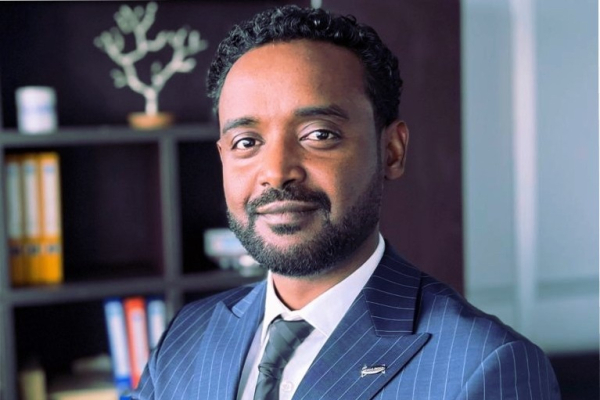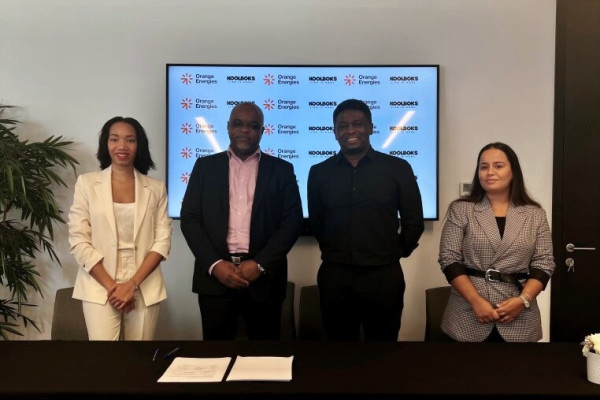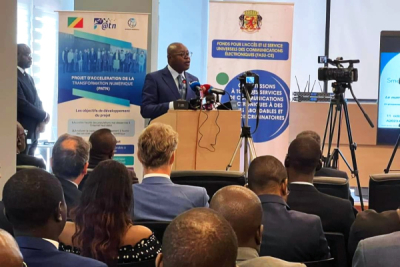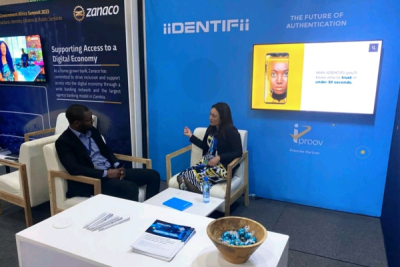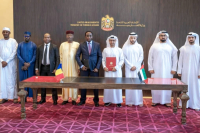Aklilu Tadesse is an innovative and ambitious entrepreneur contributing to the development of the logistics sector in Ethiopia. His company Garri Logistics is supported by Google through various programs.
Aklilu Tadesse (photo) is the CEO and one of the co-founders of Garri Logistics, an Ethiopian startup that facilitates domestic freight and digitalizes supply chain processes. He graduated from the University of Bahir Dar, Ethiopia, with a Bachelor's degree in Industrial Engineering.
In 2020, he launched Garri Logistics, together with Daniel Temesgen and Michael Andersland. The idea is to enable shippers and importers to easily and reliably move their goods anywhere in the country, using approved carriers. With that in mind, Garri Logistics takes care of all aspects of the supply chain, from requesting quotes to delivering paperwork, including real-time transport tracking. The logistics company is also beneficial to professional drivers, who can earn more money per trip, have a safer and more flexible work experience, and develop better relationships with shippers. It strives to find multiple, round-trip routes to minimize empty miles and maximize user revenue.
In 2022, Garri Logistics was selected as one of the 60 startups in the second cohort of the Google for Startups Black Founders Fund for Africa program. More recently, on October 5, 2023, the company was selected to participate in the Google for Startups Accelerator: AI First program.
Prior to Garri Logistics, Aklilu Tadesse was a Business Systems Analyst at Construction Solutions. In 2006, he became a Quality Engineer at Flintstone Engineering, an Ethiopian construction company. As a senior consultant with GIZ Ethiopia, he has helped over 100 construction companies achieve ISO 9001 QMS certification, and trained over 2,500 people in leadership, project, operations, and quality management as well as process analysis and optimization.
Melchior Koba
Electricity is a key asset for socio-economic development in Africa. However, it is still inaccessible to millions of people due to the weakness of public distribution systems. In that context, private initiatives are multiplying around off-grid products.
Earlier today (October 17), French telecoms group Orange, through Orange Energie –its division dedicated to the promotion of energy solutions across Africa– launched solar freezers in the Democratic Republic of Congo.
The product was developed by Koolboks, a company specializing in innovative solar cooling solutions. It is equipped with solar panels and batteries providing up to three days of autonomy. The solar equipment also includes LED bulbs and USB ports for recharging equipment such as phones and tablets. Accessible via Orange Energie's pay-as-you-go platform, the solar freezers can be purchased using an adjustable fractional payment system via the Orange Money service.
The partnership with Koolboks “marks a new phase in our ambition after providing access to essential services. The new phase entails enabling families to contribute to the development of their communities,” said Nat-Sy Missamou, Senior Vice President Africa and Middle East at Orange Energie.
The solar-powered freezers will enable families to light up, communicate, and generate additional income by opening local businesses, among other things. Ayoola Dominic, founder and CEO of Koolboks, explains that "this product was designed to meet a need, and enable small traders and families living in off-grid areas to store food and have light."
In Africa, where almost 600 million people still have no access to electricity due to the poor coverage of public distribution systems, the Orange and Koolboks offer is a strategic move to make essential services accessible to as many people as possible. For Orange, in particular, this collaboration reinforces its ambition to be a multiservice operator.
After the DR Congo, Orange Energie and Koolboks plan to market solar freezers in eleven other countries. These are Burkina Faso, Cameroon, Central African Republic, Côte d'Ivoire, Democratic Republic of Congo, Guinea, Jordan, Liberia, Madagascar, Mali, Senegal and Sierra Leone.
Digital transformation has greatly accelerated in Africa over the past three years. Aware of the stakes involved, African governments are taking initiatives to develop digital technology and democratize the Internet.
In Congo, the telecom regulator ARPCE will deploy 3rd generation (3G) mobile technology in 184 white zones across the country. The new territories, located in the Likouala and Cuvette-Ouest departments, were identified on Tuesday, October 11 in Brazzaville, during the presentation of a study commissioned by the regulator to open up white zones.
According to the study, carried out by the consulting firm Smart World Partners, by bringing 3G to these new localities, at least 250,000 inhabitants will be reached by high-speed telecom services. Among other things, the technology will give them the ability to communicate better, access online learning or business opportunities, get better informed, and even access certain government services that are going digital.
The 3G rollout plan falls within the framework of the Digital Transformation Acceleration Project (PATN) and the national strategy for the development of the digital economy, Congo Vision 2025. It will be financed by Congo’s universal service fund FASUCE, whose necessity for the development of broadband connectivity and digital inclusion was reaffirmed in the study. To date, the fund has enabled the government to connect 153 localities or "white zones" to high-speed telecoms services and to build 19 multimedia rooms across the country.
During the presentation, after the FASUCE’s importance was reaffirmed, Telecoms Minister Leon Juste Ibombo (photo, center) assured that all the stakeholders involved would make sure the “most remote Congolese localities can access the Internet, online education, and public digital services.” He also called the stakeholders to “responsible commitment” and transparency in the management of identified projects.
Samira Njoya
The Chamber of Information Technology and Telecommunications (CIT), the sponsor of Egypt's digital industry, is currently participating in GITEX Global 2023 with 19 Egyptian tech companies.
The said companies are currently showcasing their expertise to other participants in Dubai. The aim is to establish partnerships with international companies and explore the latest trends and innovations in the communications and information technology sector.
With the streaming industry booming worldwide African platforms are trying to make their mark in this market, dominated by giants such as Spotify, Deezer, and Apple Music.
Colorfol is a digital solution developed by a Cameroonian startup. It gives users access to audio and video content promoting African music and independent artists.
Through its mobile app –Available for Android and iOS devices, users can create an account by inputting their e-mail address and password. Once created, the account allows the user to browse the various contents offered by the application. They can browse depending on their taste with either the free plan or the premium one, which costs €0.2/day.
With the free plan, users can access all the platform's content, from songs to podcasts, but ads are unavoidable. The premium plan is to get rid of ads and access song lyrics, be able to listen to songs offline or access online radio. Audio quality is also better with the premium than the free plan.
In addition to these features, Colorfol integrates an online ticketing service where users can purchase tickets for showcases, concerts, shows, or cultural events featuring various artists. The startup integrates several payment methods such as mobile money, bank cards, and money remittance applications to carry out transactions on the platform.
Since its launch, the Android version of its mobile application has been downloaded more than 5,000 times. Colorfol is one of the ten African startups that won the 2023 edition of the AFD Digital Challenge.
Adoni Conrad Quenum
iiDENTIFii, a startup that developed facial authentication technology for smartphones and computers, announced last week the signing of a partnership with Zambia National Commercial Bank (ZANACO). The partnership aims to roll out the startup’s ID solutions in Zambia. "In Zambia, we aim to address challenges related to digital exclusion, limited access to services, and identity fraud. Many individuals across the continent lack recognized identification, which hampers their access to banking, healthcare, and government services,” explained Gur Sheva, founder of iiDENTIFii.
Since 2016, Sony has upped its investments to develop the tech sector in various parts of the world. In Africa, the company has decided to bank on an industry it knows quite well.
Last week, Japanese tech firm Sony Group Corporation announced the launch of the Sony Innovation Fund: Africa, a seed fund to support African startups. The new fund, launched in collaboration with the International Finance Corporation (IFC), is endowed with $10 million capital. It will target startups in the entertainment industry, notably in the gaming, music, cinema, and content distribution subsectors.
"Through the activities of Sony Innovation Fund: Africa, we hope to accelerate the growth of the African entertainment industry and contribute to the progress and development of the region by providing opportunities for collaboration with the entertainment businesses within [Sony Group Corporation]," commented Executive Deputy President and CSO, Sony Group Corporation.
The entertainment industry is booming on the continent. Giants such as Netflix, Amazon Prime, and Canal+ are investing in African cinema and local content creation. Last April, Netflix said it has invested over €160 million in film production in Africa since 2016. Yet startups in the sector are struggling to attract capital, capturing just $42 million in 2022, or 0.9% of total venture capital investment attracted by the continent over the said period, according to data from Partech Africa.
"The entertainment field has been a key area of focus for Sony Innovation Fund since the beginning and will continue to be. Africa, in particular, has a vibrant community of creators and entrepreneurs looking to invent new ways to enhance entertainment experiences for audiences and that propelled Sony to establish SIF: AF," explains Gen Tsuchikawa, CEO of Sony Ventures, the corporation in charge of the management of all of Sony’s venture investment activities.
Adoni Conrad Quenum
In Africa, the use of VPNs has grown significantly with the frequent Internet blackout strategy used by governments to prevent access at times. Some may soon be unable to access that solution.
On Friday, October 13, the Tanzania Communications Regulatory Authority (TCRA) issued a public notice calling on individuals and companies whose activities depend on virtual private networks (VPNs) to “declare their VPN and all relevant information including IP address.” The deadline for compliance is set to October 30.
Paragraph 2 of Article 16 of the Electronic and Postal Communications Act 2020 stipulates that "it is prohibited to make, possess or distribute any technology, program, application or any other related element that enables or helps users to access prohibited content." The law provides for a fine of at least 5 million Tanzanian shillings (approx. $1,996) or imprisonment for at least twelve months, or both.
VPNs enable users to protect themselves online by creating a private connection between their devices and the Internet. They drastically reduce the risk of hacking, encrypt IP addresses, and grant users a new online identity. However, it is also used by cybercriminals who favor it for the anonymity it offers. In some countries, such as China, India, and Russia, the use of VPNs is highly restricted.
Tanzania is no pioneer in this field. By identifying VPN users, the authorities want to keep an eye on everyone –honest people and potential criminals alike– to be able to take effective action if necessary. Tanzania is one of 22 African countries with National Computer Incident Response Teams (CIRTs), and one of 18 on the continent with national cybersecurity strategies.
Adoni Conrad Quenum
In January 2019, Senegal signed a memorandum of understanding with France's National Centre for Space Studies and Ariane Group. The first spinoffs were expected for 2021, but it seems things are finally falling into place.
The Republic of Senegal will receive its first satellite, baptized GAINDESAT, on November 10, after three years in the making, the Ministry of Higher Education, Research, and Innovation (MESRI) announced in a press release published on its web portal on Friday, October 13.
"After three years of hard work, Senegal's first satellite will be delivered on November 10, 2023, during a ceremony to be presided over by the MESRI on the premises of the Centre Spatial Universitaire de Montpellier [CSUM] in France," the release points out.
The nanosatellite is part of the SenSAT space program launched by the government to meet the country's needs for space products and services and to make the space sector a key driver for its socio-economic and sustainable development. It is the result of a partnership agreement signed, in January 2019, by MESRI and the Centre Spatial Universitaire de Montpellier.
The €1 million agreement catered for the training of eight engineers and five technicians in the manufacture and operation of space tools. Under the supervision of MUSC engineers, the beneficiaries designed and built Senegal's first satellite.
Once the satellite is delivered, the government will set a date for its launch. The satellite was initially scheduled for launch in 2021, but COVID-19 and its impacts forced the government to postpone the operation until this year.
According to Senegalese authorities, the nanosatellite will connect to all the stations on each pass, draw in all the data recorded by these stations, and transmit them directly. The data, in turn, will help prevent and combat bushfires, floods, and erosion, as well as develop agriculture, among other things.
Samira Njoya
On the sidelines of the Regional Cybersecurity Week Abu Dhabi, October 8 to 13, Chad's Minister of Telecommunications and Digital Economy, Mahamat Allahou Taher, and the head of the UAE government's Cybersecurity Council, Mohamed Hamad Al Kuwaiti, signed a memorandum of understanding.
Under the terms of the agreement, the two countries will collaborate in the fields of cybersecurity, the fight against cybercrime, and international cooperation in cyber matters, among other things.
More...
Some 2.6 billion people still have no access to the Internet across the globe. In remote areas, where conventional networks seem limited, satellites are positioning themselves as a reliable alternative.
On Friday, October 6, American e-commerce giant Amazon launched the first two satellites of its 3,236-satellite constellation. Dubbed "Project Kuiper", the satellites will orbit lower around the Earth to provide high-speed, low-latency satellite Internet services like Elon Musk’s Starlink.
Project Kuiper aims to bridge the digital divide by providing fast, affordable broadband to communities unserved or underserved by traditional communications technologies. To achieve this, Jeff Bezos's company intends to invest $10 billion.
"Our goal with Project Kuiper is not just to connect unserved and underserved communities, but also to delight them with the quality, reliability, and value of their service. [...] From day one, every technology and business decision we’ve made has centered on what will deliver the best experience for different customers around the world, and our range of customer terminals reflects those choices," explained Rajeev Badyal, Amazon’s vice president of technology for Project Kuiper, last March.
Amazon, which is still lagging in terms of satellite deployment, ultimately wants to compete with Starlink in the satellite internet segment. For that purpose, it plans to launch more than 1,500 satellites before 2026 to retain its operating license granted in 2020 by the US Federal Communications Commission. Meanwhile, Starlink already has over two million active users worldwide with plans to conquer the African market. This year, it intended to enter 23 African markets but currently, it has effectively launched in six owing to various legislations.
It is worth noting that the costs of Starlink’s equipment are pretty high for the average African. Earlier this month, the company decided to reduce the cost of its equipment by 21% in Nigeria, from 378,000 naira (around $487) to 299,000 naira. Last September, Kenyan President William Ruto also asked Starlink to reduce the price of its services. The equipment costs 89,000 Kenyan shillings (approx. $595), with a delivery charge of 3,100 shillings. In Zambia, the equipment costs 10,774 kwachas (around $505).
Will Amazon’s equipment be more affordable for Africans?
Amazon wants to offer three antenna models for its customers. The firm revealed that the production cost of the standard model is around $400, which implies that the standard selling price will be higher than this amount. Truly, equipment is a one-off expense but, at this rate whether it is higher than that practiced by Starlink in African markets or not it remains high. What's more, after reducing its prices in Nigeria, Elon Musk's firm will probably continue this pricing policy in other markets to standardize its offerings across the continent.
As a reminder, the number of people covered by fixed broadband in Africa remains below 10%. This is the lowest level in the world. With conventional networks’ failure in this area, satellite Internet remains the most attractive alternative for remote and underserved areas to access broadband Internet.
Adoni Conrad Quenum
According to the UN, climate change is one of the major challenges of our times. More so in Africa, which is bearing the highest cost despite accounting for the lowest carbon emissions. In Ghana, a tech entrepreneur wants to contribute to the reduction of carbon emissions, therefore helping combat climate change. Through Solar Taxi, he ensures a clean and sustainable environment with taxis that use renewable energy.
Ghanaian tech entrepreneur George Kwadwo Appiah (photo) is the CEO and one of the co-founders of Solar Taxi, a local transport services company offering solar-powered vehicles.
He graduated from the Kwame Nkrumah University of Science and Technology (KNUST), in 2016, earning a master's degree in renewable energy technology. The same year, he earned a master’s in business administration from the Edinburgh Business School.
His company was founded in 2018. It provides locally assembled electric motorcycles, tricycles, and cars, as well as access to solar charging stations. Doing so, it aims to reduce air pollution caused by gasoline-powered vehicles, offer Ghanaians an affordable transport alternative, and create jobs for young people.
It also has a training academy where Ghanaians are taught how to drive and maintain electric vehicles. On September 21, 2023, it was announced among the selectees for the Google for Startups Accelerator: Climate Change.
Currently, its CEO, George Kwadwo Appiah, is a research assistant at KNUST's The Energy Center. In 2014, he founded Ghana Hubs Network, a network of Ghanaian innovation centers. He is also the CEO of QuadSolar, a solar system installation company, and Executive Director of Ghana Tech Lab, an ecosystem that serves as a digital innovation space aimed at accelerating digital skills and digital entrepreneurship in Ghana.
In 2015, he co-founded Kumasi Hive, a coworking, training, and incubation space that aims to promote social and technological entrepreneurship in Ghana. Kumasi Hive offers young innovators access to equipment, mentors, training, and funding opportunities to develop their ideas and solutions. Solar Taxi was founded through Kumasi Hive.
George Kwadwo Appiah received the Academic/Research Excellence Award (student category) in 2014. His company, Solar Taxi, has also attracted international attention. It was featured by The Org network as one of three African electromobility startups to watch in 2023.
Melchior Koba
To facilitate the organization of events and the acquisition of tickets by the public, an Ivorian tech entrepreneur has developed a technological solution.
SkanTicket is a technological solution developed by Ivorian startup Skan Technologies. On the one hand, it enables event promoters to create tailor-made events, offer tickets and/or invitations online, promote the event, and manage access control on the big day. On the other hand, it offers people the chance to purchase tickets for various events online. The startup was launched by Nancy Aphey Anicet Amani.
The solution has a mobile app for Android and iOS devices. Once downloaded, the app allows users to create an account by entering their e-mail address and a password. After that, they create events or buy tickets. For each event created, SkanTicket provides a minisite that the promoter customizes with the event logo, images, etc.
If the promoter already has a website or has one planned for the event, he/she can integrate the ticketing service from his organizer's space, by exporting the widget with a simple copy and paste. No special IT skill is needed to use the tool. Once the tickets have gone on sale, sellers can receive the proceeds of the sales on the 1st and 16th day of every month through bank transfer.
SkanTicket, which integrates mobile money payment systems from telecom operators MTN and Orange, collects 5% of all sales. It provides a USSD code to enable users with no smartphone to also buy tickets.
Since its launch, the Android version of its mobile application has already been downloaded more than 10,000 times. In 2023, the startup was among the ten winners of the AFD Digital Challenge.
Adoni Conrad Quenum
The sheer volume of high-speed telecom infrastructure deployed in Africa since 2010 has made the continent a market with high financial potential for many international tech groups. But these investments appear to be underexploited.
Over the past ten years, the number of people covered by fixed broadband in Africa has remained below 10%, despite the considerable financial investments made during this period. In its "Global Connectivity Report 2022", the International Telecommunication Union (ITU) reports that in 2021, only seven out of every hundred households were covered by the service, compared with 82% for mobile. This is the lowest level worldwide and has not changed since. In Europe, the coverage rate is 96%, compared with 88% and 86% respectively in the Asia-Pacific and Americas.
In terms of subscriptions, only 1% of consumers had subscribed to the service on the continent by 2021. This was also the lowest level worldwide. In Europe, the figure was 35%, compared with 23% and 17% in the Americas and Asia-Pacific respectively, according to the ITU.
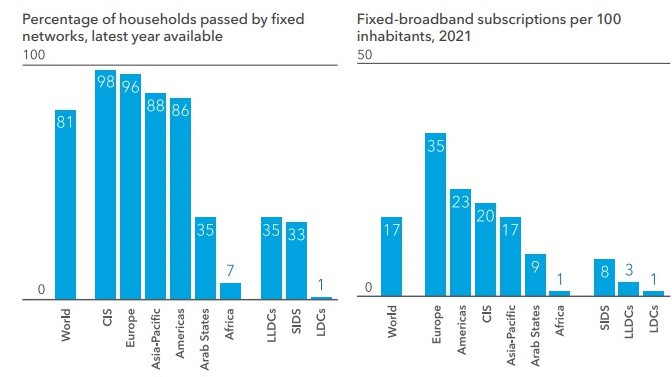
Worldwide fixed broadband coverage (Source: ITU, 2021)
According to the ITU, the lag in fixed broadband is explained by consumer preference in terms of usage. They opt for mobile, which is more flexible and less expensive. For telecom operators, the choice is explained by investment costs. "Fixed broadband networks are very costly to deploy, maintain, and upgrade, depending on the geography and extent of the territory to be covered," says the ITU. At 17.9% of monthly gross national income per capita, fixed broadband access costs in Africa are the most expensive in the world. Meanwhile, the ITU recommends less than 2%.
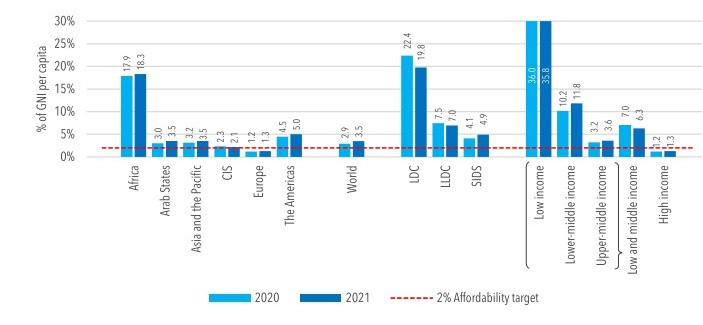
Fixed broadband access costs in 2021 (Source: ITU)
Since 2020, Africa has recorded the fastest annual growth rate in Internet transmission capacity in the world, according to the report "The State of Broadband 2023 Digital Connectivity: A Transformative Opportunity" by the United Nations Broadband Commission. The continent is already home to more than 25 submarine fiber optic systems and is covered by almost 1.2 million km of terrestrial fiber optics. But only 25% of the population lives within 10 km of a fiber optic network.
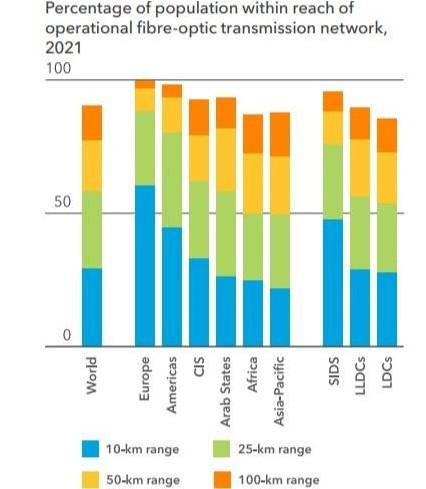
Percentage of population near a fiber optic network (Source: ITU)Worldwide, only 2.3 billion people (29%) were living within 10 kilometers of a fiber optic network in 2021. In Europe, over 60% of the population lives within 10 kilometers of a fiber-optic network, nearly 47% in the Americas, and 22% in the Asia-Pacific region.
“Although more people use mobile networks than fixed networks to connect to the Internet, the latter remains important. For example,fixed-broadband networks generally have a higher data capacity than mobile networks, and download limits are higher than similarly priced mobile-broadband plans. They are faster and are more reliable than 3G or 4G networks, making them more suited for high-bandwidth activities such as games and video calls," explains the Union.
Broadband internet is more strategic for small and medium-sized businesses. In its survey "The State of Broadband: Accelerating Broadband for New Realities September 2022," the Broadband Commission for Sustainable Development conducted a survey of informal businesses in nine African countries, revealing low levels of ICT use. "Internet use for business purposes was 7% on average, ranging from 24% in South Africa to 1% in Rwanda. Computer ownership is also low: over 90% of businesses surveyed in Ghana, Kenya, Mozambique, Nigeria, Rwanda, Tanzania, and Uganda said they did not have one," the survey shows
While a one-person micro-business may find that a smartphone with wireless access is sufficient to carry out its activities, particularly for online sales on social media, many businesses still feel that they don't need Internet access or a computer. Yet, fixed broadband can improve operational and commercial activities, as the Covid-19 crisis demonstrated.
In the report "Economic impact of broadband in LDCs, LLDCs, and SIDS: An empirical study, 2019", the ITU estimates that a 10% increase in fixed broadband penetration would increase gross domestic product per capita by 2.0 to 2.3%.
Muriel Edjo


